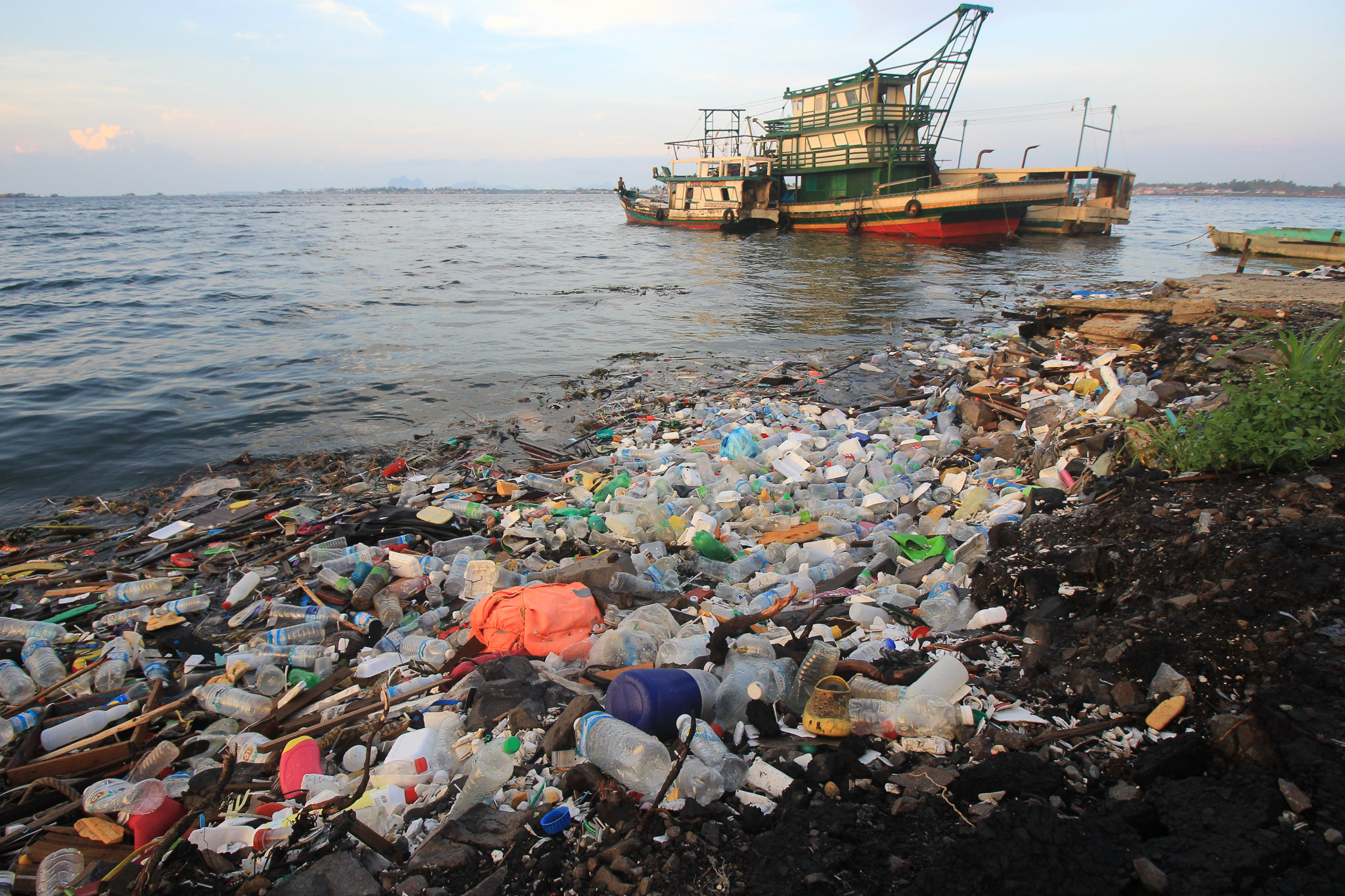“Additionality” and traceability crucial for countering greenwashing in business-led plastic reduction

The issue of plastic pollution has long raised deafening alarms around the world. Studies have indicated that microplastics can now be found from high up in the clouds to inside our own carotid arteries. In March of 2022, the United Nations (UN) Environment Assembly adopted a resolution in which more than 170 countries pledged to develop an international legally binding instrument by the end of 2024 to put a halt to further plastic pollution. In addition to regulatory efforts by governments, how can the business sector leverage new technologies and innovative thinking to create fresh opportunities to tackle this pressing challenge?
Complexity of Plastic Impedes Recycling and Circular Economy
According to Professor Sean Zhou Xiang, Chairperson of the Department of Decisions, Operations and Technology of the Chinese University of Hong Kong (CUHK), recycling plastic has been extremely complex and difficult due to the wide variety of plastics, composed of various chemical polymers. In addition, because plastic is a by-product of petroleum and is abundantly available, the prices of virgin plastic are often significantly lower than those of recycled plastic. This disparity has hindered the development of a sustainable operational ecosystem for plastics recycling industry worldwide. As a result, the plastics industry continues to operate on a linear economy model, with many plastic products being discarded without proper treatment. According to a UN report, since the mid-20th century, when plastics became widely used, until 2017, eight billion tonnes of plastic waste were generated globally. Less than 10% of this waste was recycled, with the vast majority ending up in landfills or oceans.
Furthermore, some developed countries traffic their plastic waste to developing countries, one of the most common forms of “waste colonialism”. This complicates the issue and demands an international response. Due to a lack of infrastructure and technology to process such large amounts of plastic waste, low-income countries often resort to incineration or dumping the excess plastic into landfills or the ocean. A study on marine waste found that Southeast Asia is now the world’s largest source of plastic waste in the marine environment. In 2021, six of the top ten countries contributing to global ocean plastic pollution were in Southeast Asia, including the Philippines, Malaysia, Indonesia, Myanmar, Vietnam and Thailand. Collectively, these countries account for more than half of the total global marine plastic pollution. The discarded plastic drifts through the ocean, breaks down into microplastics and enters the food chain, where it poses significant threats to human health and global ecology.

Plastic recycling industries worldwide struggle to establish sustainable operational ecosystems, resulting in a large number of plastic products still following a linear economy model, where they are discarded without proper treatment
Combating Plastic Waste with Blockchain-Driven Business Models
In spite of these environmental threats, many green enterprises are recognising the opportunities in developing new business models. For example, Plastic Bank, a social enterprise based in Canada, has created a mobile app that uses blockchain technology to connect plastic collectors in developing countries with plastic waste processing companies. The app can also track the provenance of recycled plastic. These collectors can exchange their picked plastic for “bonus”, which can then be used to buy their daily necessities such as rice, cooking oil, soap or even pay for tuition.
In 2021, Professor Zhou wrote a paper with his PhD student and collaborators at the Rotman School of Management at the University of Toronto, entitled “Innovative Business Models in Ocean-Bound Plastic Recycling”. He examined how companies such as Plastic Bank, rePurpose Global and #tide adopted innovative business models to encourage more plastic recycling, simultaneously addressing environmental, social and economic needs. The study specifically focused on two green products: “plastic offsets” and “social plastic”.
The concept of “plastic offsets” mirrors that of carbon offsets, where financial support is provided to recycling and environmental programmes through the sale of “plastic offsets” to counterbalance the unavoidable plastic waste generated by individuals or businesses. On the other hand, “social plastic” refers to recycled plastic that has been certified as ethically sourced and processed according to certain standards, and typically costs more than regular recycled plastic. Large companies substitute virgin plastic for social plastic in their products or packaging to reduce their environmental footprint and promote their brand image.
Professor Zhou’s research and its simulation reveal that when companies sell either “plastic offsets” or “social plastic”, their environmental and social impact, as well as their profitability, will be determined by the size of their respective markets, which are influenced by public environmental awareness and government regulations. However, if companies sell both products concurrently in the same market, the overall volume of recycled plastic and the company’s profit can increase significantly because of the synergies between these two lines of business. In areas with greater environmental awareness, this hybrid business model proved to be even more effective in increasing recycling volume and profitability.
According to Professor Zhou, establishing a sustainable plastic recycling ecosystem could enable these social enterprises to achieve a triple bottom line: increasing the volume of waste plastic recycling, improving the economic conditions of waste collectors in developing countries and helping companies achieve profitability.

According to Professor Zhou, when companies sell “plastic offsets” and “social plastic” concurrently in the same market, the overall volume of recycled plastic and the company’s profit can increase significantly
Promoting Trustworthy and Impactful Plastic Reduction through “Additionality”
Although trust is the foundation of sustainable development, it is observed that investors have become increasingly sceptical when evaluating the sustainability performance of companies. One reason for this is the lack of tangible results despite years of ESG advocacy. The prevalence of corporate greenwashing has also eroded trust among the public and investors.
As a result, the concept of “additionality” has emerged. The aim of this concept, derived from carbon offsetting, is to determine whether current sustainability efforts provide new or additional benefits, resulting in net positivity and creating environmental impacts that did not previously exist. As an example, a UK study on an Indian wind farm supported by the UN Clean Development Mechanism estimated that 52% of the 1,350 turbines could have been built without relying on income from carbon offset sales, indicating the project’s lack of additionality in carbon offset.
Professor Zhou believes additionality also applies to the plastic offset market. Companies must demonstrate that the plastics they collect or recycle would not have been processed without the related projects. The objective is to prevent the misuse of the plastic offset market for greenwashing purposes. Furthermore, businesses that sell plastic offsets must ensure that their offset projects deliver genuine, measurable and accountable environmental benefits in order to make credible claims regarding plastics reduction. This not only enhances public trust in the plastic offset market but also showcases the business sector’s commitment to reducing plastic waste. By taking the lead, companies can raise public awareness and drive further action through successful examples.
Professor Zhou’s paper revealed that additionality considerations could sometimes reduce a company’s social and environmental impact by increasing the cost of plastic offsets. Despite this, he maintains that additionality continues to be a strong basis for the development of a credible plastic offset market, stating: “Companies that wish to highlight additionality in their operational models must continuously optimise the driving forces behind their production. Circular recycling or green projects must incorporate market-driven concepts that not only emphasise traceability and accountability but also generate net positive impacts and create value where value did not previously exist.” Selling not just plastic offsets but also social plastic can help counter the potential negative impact of additionality consideration, further justifying the adoption of hybrid models.

